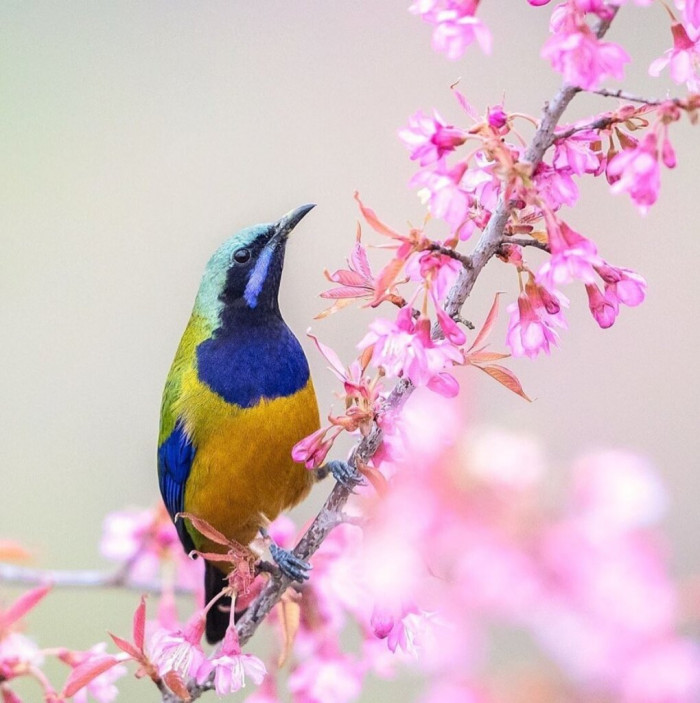One Of The Most Stunningly Beautiful Songbirds Displaying A Wide Array Of Colors Presenting The Orange Bellied Leafbird
A small songbird that displays luminous colors that almost changes when you look at it from different angles.

The Orange Bellied Leafbird with a scientific name - Chloropsis hardwickii, is a beautiful small bird that displays an orange belly with a green back and blue tail. Some of them also have patches of black and blue above the breast or at the throat area.
The beak of the Orange Bellied Leafbird is a bit curved and night black in color. The male is more colorful than the female Orange Bellied Leafbirds, and they breed with no exact time during the year and the average number of eggs a female lays is about 2 to 3.
They feed on nectar and insects like spiders. While these birds do not migrate, they have a large population and are seen mostly in the northern parts of Southeast Asia and the Himalayas, particularly in Yunnan and they are not considered endangered according to the IUCN.
If you are fond of birds and you enjoy looking at the ones with the most vivid colors, you will surely enjoy the Orange Bellied Leafbird. It will definitely catch your attention easily, especially the male ones that display the most vibrant colors.
Don’t forget to share this post to your family and friends and enjoy the rest of the day!
Here's the orange bellied Leafbird
 Instagram/ourbirds_india
Instagram/ourbirds_indiaChloropsis hardwickii
Did you know that even though the birds are called orange bellied leafbirds, the most dominant color you will see in them is green? The green color allows them to blend in with nature and protects them from predators.
Orange bellied leafbirds that are mostly green in color are said to be stressed out. These birds lose their colorful feathers when they are stressed.
While it looses its beauty, it is said to be an advantage for these birds to confuse the predators in the forest.
 Instagram/nikonmic
Instagram/nikonmicMale Vs Female
When young, the orange bellied leafbirds look the same, regardless if it is female or male. They only change in color once they reach adulthood where the males tend to be more colorful than the females.
 Instagram/birdsinwild
Instagram/birdsinwildHow far they can go
While these birds are not fond of migrating, due to the large population of it, you may also find the orange bellied leafbirds extending to Hong Kong, Vietnam, and even in Macao.
 Instagram/tanxiangln
Instagram/tanxianglnThey go in pairs
Unlike other birds, the orange bellied leafbirds are not normally seen in big groups. Instead, they go alone or in pairs and roam, flying around the area where they live.
They enjoy eating berries, insects and nectar.
 Instagram/nikonmic
Instagram/nikonmicThey are like hummingbirds
They love nectar from flowers and they even hover around it while sucking the nectar, using its spike tongue just like how hummingbirds do.
 Instagram/nikonmic
Instagram/nikonmicBreeding process
Unlike the other birds, the orange bellied leafbird couples work together until the eggs hatch. The male is responsible in feeding the female who stays in the cup shaped nest, incubating the eggs that hatches around 14 days.
 Instagram/dragon.aves
Instagram/dragon.avesThey are not considered vulnerable according to the IUCN
 Instagram/wildeyeview
Instagram/wildeyeviewWatch the orange bellied leafbird here
If you want to know more about the orange bellied leafbird, see it here in action.
Did you like what you have read in this post about the orange bellied leafbird? These birds are definitely one of the most adorable small birds that are fortunately not yet vulnerable up to this day.
Thank you very much for reading and we hope that you were able to enjoy it!

